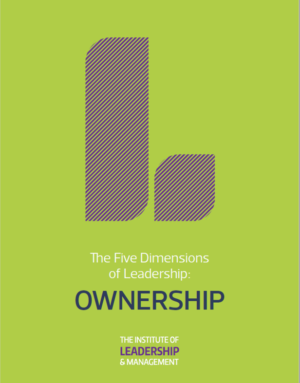Why ownership?
Download the report
Want to go further? Download our comprehensive report to see the full picture on Ownership.

Components
Taking Initiative
Taking Initiative is a component of Ownership. Within Taking Initiative, we also cover key topics including Spotlight on Confidence and Impostor Syndrome, Spotlight on Recognising Opportunities and Spotlight on Approaches to Initiative.
Leading in Different Contexts
Leading in Different Contexts is a component of Ownership. Within Leading in Different Contexts, we also cover key topics including Spotlight on Business Legal Entities, Spotlight on Business Models and Spotlight on Public Sector Leadership.
Managing Upwards
Managing Upwards is a component of Ownership. Within Managing Upwards, we also cover key topics including Spotlight on Followership, Spotlight on Managing your Boss and Spotlight on Co-creation.
Empowering
Empowering is a component of Ownership. Within Empowering, we also cover key topics including Spotlight on Delegation, Spotlight on Empowerment and Spotlight on Participative Leadership.
Learning from Mistakes
Learning from Mistakes is a component of Ownership. Within Learning from Mistakes, we also cover key topics including Spotlight on Constructive Feedback, Spotlight on Blame Cultures and Spotlight on Experiential Learning.
Time Management
Time Management is a component of Ownership. Within Time Management, we also cover key topics including Spotlight on Focus, Spotlight on Prioritisation and Spotlight on Procrastination.
Decision Making
Decision Making is a component of Ownership. Within Decision Making, we also cover key topics including Spotlight on Decision Making Tools and Techniques, Spotlight on Cost-Benefit Analysis and Spotlight on Implementation and Evaluation.
Problem Solving
Problem Solving is a component of Ownership. Within Problem Solving, we also cover key topics including Spotlight on Problem Solving Tools and Techniques, Spotlight on Gap Analysis and Spotlight on Intuition Problem Solving.
Critical Reflection
Critical Reflection is a component of Ownership. Within Critical Reflection, we also cover key topics including Spotlight on Reflective Practice, Spotlight on Critical Thinking and Spotlight on Action Learning.
Social Responsibility
Social Responsibility is a component of Ownership. Within Social Responsibility, we also cover key topics including Spotlight on Ethical Supply Chain Management, Spotlight on Corporate Social Responsibility (CSR) and Spotlight on Corporate Citizen.
Learning
Learning is a component of Ownership. Within Learning, we also cover key topics including Spotlight on Growth Mindset, Spotlight on Personal Development Planning and Spotlight on Formal and Informal and Social Learning.
Personal Brand
Personal Brand is a component of Ownership. Within Personal Brand, we also cover key topics including Spotlight on Credibility and Reputation, Spotlight on Personal Brand Management and Spotlight on Being 'on-brand'.











